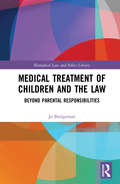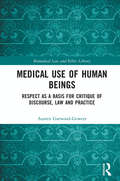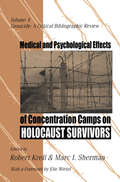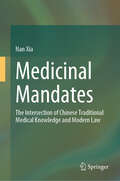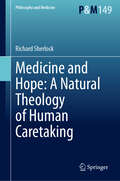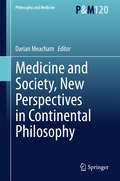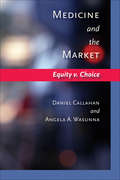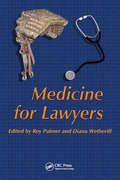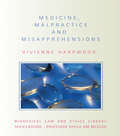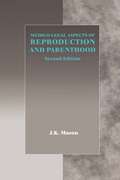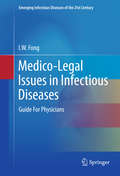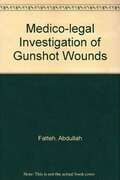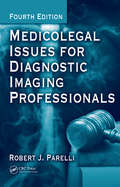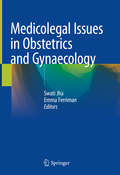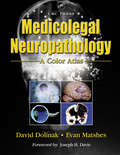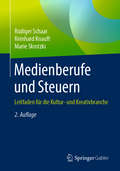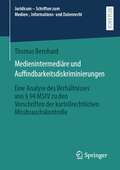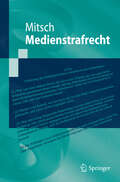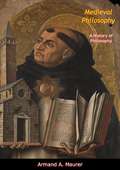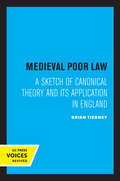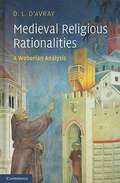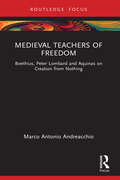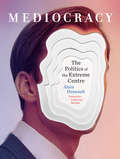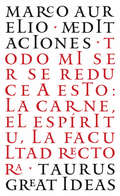- Table View
- List View
Medical Treatment of Children and the Law: Beyond Parental Responsibilities (Biomedical Law and Ethics Library)
by Jo BridgemanThe high profile cases of Charlie Gard, Alfie Evans, and Tafida Raqeeb raised the questions as to why the state intrudes into the exercise of parental responsibility concerning the medical treatment of children and why parents may not be permitted to decide what is in the best interests of their child. This book answers these questions. It argues for a reframing of the law concerned with the medical treatment of children to one which better protects the welfare of the individual child, within the context of family relationships recognising the duties which professionals have to care for the child and that the welfare of children is a matter of public interest, protected through the intervention of the state. This book undertakes a rigorous critical analysis of the case law concerned with the provision of medical treatment to children since the first reported cases over forty years ago. It argues that understanding of the cases only as disputes over the best interests of the child, and judicial resolution thereof, fails to recognise professional duties and public responsibilities for the welfare and protection of children that exist alongside parental responsibilities and which justify public, or state, intervention into family life and parental decision-making. Whilst the principles and approach of the court established in the early cases endure, the nature and balance of these responsibilities to children in their care need to be understood in the changing social, legal, and political context in which they are exercised and enforced by the court. The book will be a valuable resource for academics, students, and practitioners of Medical Law, Healthcare Law, Family Law, Social Work, Medicine, Nursing, and Bioethics.
Medical Use of Human Beings: Respect as a Basis for Critique of Discourse, Law and Practice (Biomedical Law and Ethics Library)
by Austen Garwood-GowersWhilst activities like transplantation and medical research have typically been considered on a discrete basis, they are also actually part of a broader phenomenon of medical means being employed to make use of human beings. This book is the first ever systematic critique of such medical use of the human being as a whole. It is divided into two parts. The first part considers what constitutes an appropriate normative lens through which to view such medical use and its constraint. It makes a reasoned ethical and human-rights-based case for preferring respect for human worth over any of the main alternative approaches that have been drawn on in specific contexts and outlines what this preference practically implies. The second part uses this respect-based lens to critique use discourse, law and practice. Drawing on three contrasting case study areas of warfare-related medical use, transplantation and human tissue research, this book exposes both the context-specific and thematic nature of shortfalls in respect. Overall this book provides a compelling analysis of how medical use ought to be constrained and a compelling critique of the excesses of discourse, practice and governance. It is recommended to academics, students, policymakers and professionals whose work is focused on or intersects with the medical sector and anyone else with an interest in medicine and its limits.
Medical and Psychological Effects of Concentration Camps on Holocaust Survivors: A Research Bibliography (Genocide Ser. #Vol. 4)
by Robert Krell & Marc I. ShermanThis unique research bibliography is offered in honor of Leo Eitinger of Oslo, Norway. Dr. Eitinger fled to Norway in 1939, at the start of the World War II. He was caught and deported to Auschwitz, where, among others, he operated on Elie Wiesel who has written the foreword to this volume. After the war, Eitinger became a pioneering researcher on a subject from which many shied away. His contributions to understanding of the experience of massive psychological trauma have inspired others to do similar work. His many books and papers are listed in this special volume of the acclaimed bibliographic series edited by Israel W. Charny of The Institute on the Holocaust and Genocide in Jerusalem.In order to acquaint users of this bibliography with the topic, two introductory articles are offered. The first is titled "Survivors and Their Families" and deals with the impact of the Holocaust on individuals. The second, "Psychiatry and the Holocaust," examines the general impact of the Holocaust on the field of psychiatry. Robert Krell writes that in general the psychiatric literature has reflected critically on the survivor due to preconceived notions held by many mental health professionals. For many years, the exploration of victims' psychopathology obscured the remarkable adaptation made by some survivors. The problems experienced by survivors and possible approaches to treatment were entirely absent from mainstream psychiatric textbooks such as the Comprehensive Textbook of Psychiatry throughout the 1960s and 1970s.Fifty years of observations about survivors of the concentration camps and other survivors of the Holocaust (in hiding, as partisans, in slave labor camps) has provided a new body of medical and psychiatric literature. This comprehensive bibliography contains a plethora of references to significant pieces of literature regarding the Holocaust and its effects on survivors. It will be of inestimable value to physicians, psychiatrists, psychologists, and social workers, along with historians, sociologists, and Holocaust studies specialists.
Medicinal Mandates: The Intersection of Chinese Traditional Medical Knowledge and Modern Law
by Nan XiaThis book provides an in-depth analysis of Traditional Medical Knowledge (TMK) in China, focusing on its preservation, responsible use, and integration into modern intellectual property (IP) frameworks. It explores the unique challenges of protecting TMK within China&’s historical, cultural, and societal contexts, while also considering alternative regulatory mechanisms like Access and Benefit-Sharing (ABS) regimes and TMK databases. Through case studies such as the commercialization of Qinghao, the book examines the role of TMK in pharmaceutical innovation and critiques the applicability of Western IP systems to Chinese TMK. It also discusses the need for culturally sensitive legal reforms, offering practical insights for scholars, policymakers, and practitioners interested in IP law, traditional medicine, and cultural preservation. This work is enriched with comparative legal analyses and detailed examples, providing a clear understanding of the complexities surrounding TMK in China and its impact on both cultural heritage and innovation.
Medicine and Hope: A Natural Theology of Human Caretaking (Philosophy and Medicine #149)
by Richard SherlockThis book expands, in a modest way, the discussion of hope and does so by focusing on a field where it is at the core of care-taking: medicine. The three great religious virtues of medieval theology were faith, hope, and love. An enormous literature exists about faith and love, but much less exists about hope. Doctors often know what they want to do for a patient but do not know whether they are able to have a good result. If they fail, will the result be worse? They must hope they can succeed. In other cases, they know what they can do but they are uncertain whether they should. If they do not undertake action, will the patient try to do it themselves with a much worse result? Questions such as these raise the issue of the importance of hope in medicine. This book builds on an insight from the first modern textbook of medical ethics, Thomas Percival’s 1803 classic Medical Ethics. There Percival says that the doctor is a “minister of hope to the sick”. This book analyses this concept, which is central to the practice of medicine.
Medicine and Society, New Perspectives in Continental Philosophy
by Darian MeachamThis volume addresses some of the most prominent questions in contemporary bioethics and philosophy of medicine: 'liberal' eugenics, enhancement, the normal and the pathological, the classification of mental illness, the relation between genetics, disease and the political sphere, the experience of illness and disability, and the sense of the subject of bioethical inquiry itself. All of these issues are addressed from a "continental" perspective, drawing on a rich tradition of inquiry into these questions in the fields of phenomenology, philosophical hermeneutics, French epistemology, critical theory and post-structuralism. At the same time, the contributions engage with the Anglo-American debate, resulting in a fruitful and constructive conversation that not only shows the depth and breadth of continental perspectives in bioethics and medicine, but also opens new avenues of discussion and exploration. For decades European philosophers have offered important insights into the relation between the practices of medicine, the concept of illness, and society more broadly understood. These interventions have generally striven to be both historically nuanced and accessible to non-experts. From Georges Canguilhem's seminal The Normal and the Pathological, Michel Foucault's lectures on madness, sexuality, and biopolitics, Hans Jonas's deeply thoughtful essays on the right to die, life extension, and ethics in a technological age, Hans-Georg Gadamer's lectures on The Enigma of Health, and more recently Jürgen Habermas's carefully nuanced interventions on the question of liberal eugenics, these thinkers have sought to engage the wider public as much as their fellow philosophers on questions of paramount importance to current bioethical and social-political debate. The essays contained here continue this tradition of engagement and accessibility. In the best practices of European philosophy, the contributions in this volume aim to engage with and stimulate a broad spectrum of readers, not just experts. In doing so the volume offers a showcase of the richness and rigor of continental perspectives on medicine and society.
Medicine and the Market: Equity v. Choice (Bioethics)
by Daniel Callahan Angela A. WasunnaOutstanding Academic Title for 2007, Choice MagazineMuch has been written about medicine and the market in recent years. This book is the first to include an assessment of market influence in both developed and developing countries, and among the very few that have tried to evaluate the actual health and economic impact of market theory and practices in a wide range of national settings.Tracing the path that market practices have taken from Adam Smith in the eighteenth century into twenty-first-century health care, Daniel Callahan and Angela A. Wasunna add a fresh dimension: they compare the different approaches taken in the market debate by health care economists, conservative market advocates, and liberal supporters of single-payer or government-regulated systems. In addition to laying out the market-versus-government struggle around the world—from Canada and the United States to Western Europe, Latin America, and many African and Asian countries—they assess the leading market practices, such as competition, physician incentives, and co-payments, for their economic and health efficacy to determine whether they work as advertised. This timely and necessary book engages new dimensions of a development that has urgent consequences for the delivery of health care worldwide.
Medicine for Lawyers
by Diana WetherillThis book provides insight into some of the problems and pitfalls encountered in current medical practice. It helps lawyers to commission an expert witness to write a medical report and to interpret it, using their greater knowledge and a better understanding of the practice of medicine.
Medicine, Malpractice and Misapprehensions (Biomedical Law and Ethics Library)
by V.H. HarpwoodAnalyzing the level of claims for clinical negligence in the light of the most recent trends and discovering whether there is indeed a litigation crisis in healthcare, this book is a topical and compelling exploration of healthcare and doctor-patient relationships. The author: identifies and analyzes the growing pressures on doctors in modern society, placing their role in context explores some of the myths surrounding media claims about malpractice considers the practice of ‘defensive medicine’ and the difference between defensive practices and sensible risk management examines external pressures, such as political interference with clinical practice in the form of target-setting and what might be described as a culture of creeping privatization of healthcare. Covering the topics of medicine and the media and the causes of occupational stress among doctors, this volume is a must read for all students of medical law and medical ethics.
Medico-Legal Aspects of Reproduction and Parenthood (Medico-Legal Series)
by J.K. MasonThose involved in family and sexual relationships today face a bewildering variety of medico-legal dilemmas. These are encountered from as early as the preconception state of the embryo and continue throughout the period of child raising until the status of the mature minor is achieved. This book dissects a wide range of legal, medical and ethical issues surrounding reproduction and the parental relationship with the resultant child. Questions posed in the various sections include: what constitutes sexual intercourse, what are the implications of contraception and sterilization, is the abortion issues dead?. Is there a right to reproduce and, if so, how is this applied to the modern methods of assisted reproduction?. Is surrogate motherhood acceptable or workable?. The concept of fetal rights is explored and specific attention is given to the management of defective neonates in the light of recent judicial decisions. Other chapters look at the parent/child relationship in respect of medical treatment and the book concludes with a review of the interfamilial protection of young children under both the civil and the criminal law. Many of the views expressed are novel in that they represent those of a medical doctor exploring the legal field. It is neither a conventional book on family law nor one on medical law; rather, it draws on both to examine a specific area which affects both in a particularly significant way. Both statute and case law have been extensively updated since the publication of the first edition.
Medico-Legal Issues in Infectious Diseases
by I. W. FongThe aim of this book is not to encourage defensive medical practice, but to help provide better, optimum care to patients and to be forth right and honest to our dear customers about our inevitable mistakes. This book will focus on clinical issues facing physicians in different settings (which can lead to malpractice), and the best approach to use to avoid litigations, and practice good medicine.
Medicolegal Investigation of Gunshot Wounds
by Adbullah FattehWas written by an expert who at the time was a D.M.E. a visiting professor of Pathology and a consultant to the Criminal Justice Institute at Fort Lauderdale, Florida. Clearly written and easily understood, the book deals with all aspects of medicolegal investigation of gunshot wounds and deaths.The duties and responsibilities of the medical investigators and the police are explicitly outlined and guidelines are established for co-operative efforts between the two. The investigation of homicides, suicides, and accidents involving firearms, including investigation of the scene of the injury or death.
Medicolegal Issues for Diagnostic Imaging Professionals
by Colin M. Howles Zeev Shoham Robert J. Parelli David. K WeissmanThe constant advances in diagnostic imaging have had an impact on the practice, attitudes, and moral values of all who participate in health care. Now in its fourth edition, the original Medicolegal Issues for Radiographers has been updated and retitled, broadening the scope of content to include issues essential to all diagnostic imaging pr
Medicolegal Issues in Obstetrics and Gynaecology
by Swati Jha Emma FerrimanThis book highlights minimum standards relating to the management of different conditions in the practice of Obstetrics and Gynaecology. The editors explore clinical governance issues, common causes of as well as ways to avoid litigation. The UK is experiencing a dramatic increase in medico-legal claims. The 4 main reasons for litigation are: accountability, the need for an explanation, concern with standards of care and compensation. However the decision to take legal action is determined not only by the original injury, but failure to provide information, an explanation and an apology. Insensitive handling of an injury and poor communication after the original incident increases the risk of litigation and erodes the patient-doctor relationship. Doctors almost never deliberately cause harm to patients, however increasingly claims are being defended successfully. This book is invaluable to clinicians and lawyers alike and raises awareness of how to avoid facing clinical negligence claims in our day to day practice.
Medicolegal Neuropathology: A Color Atlas
by Evan W. Matshes David DolinakWith nearly 600 autopsy photographs, this atlas shows various trauma and diseases of the brain and spinal cord in the forensic context of sudden death investigation. It also provides a simple, straight forward, concise text organized in a primarily case-oriented format. Unlike most other neuropathology texts, attention is given to skull fractures and scalp injuries. Where necessary, radiologic and microscopic images have also been included to facilitate learning along with a brief general anatomy of the brain and spinal cord. Thus pathologists who are not specialized in neuropathology can compare a variety of autopsy findings with cases illustrated in the text.
Medienberufe und Steuern: Leitfaden für die Kultur- und Kreativbranche
by Rüdiger Schaar Reinhard Knauft Marie SkrotzkiKünstler und Medienschaffende stehen häufig vor scheinbar unlösbaren Problemen mit dem Finanzamt und im Zusammenhang mit der Künstlersozialkasse. Den Wenigsten gelingt es, im Dschungel aus Gesetzen, Regelungen und Sonderausnahmen den Durchblick zu behalten. In verständlicher Sprache verschafft dieser Leitfaden einen umfassenden Überblick über die Besonderheiten bei der Besteuerung von Medienberufen. Ein praxisnaher und lösungsorientierter Ratgeber für Journalisten, Musiker, Fotografen, Regisseure, Redakteure, Schauspieler und Autoren aus der Film-, Werbe- und Medienbranche sowie ihre Berater.
Medienintermediäre und Auffindbarkeitsdiskriminierungen: Eine Analyse des Verhältnisses von § 94 MStV zu den Vorschriften der kartellrechtlichen Missbrauchskontrolle (Juridicum – Schriften zum Medien-, Informations- und Datenrecht)
by Thomas BernhardKernanliegen dieses Werkes ist es, Rechtsanwender bei einer kohärenten Anwendung des am 7. November 2020 in Kraft getretenen medienrechtlichen Diskriminierungsverbots in § 94 des Medienstaatsvertrags innerhalb der Gesamtrechtsordnung zu unterstützen. Hierzu wird das Verhältnis zwischen § 94 Medienstaatsvertrag zu den Vorschriften der kartellrechtlichen Missbrauchskontrolle des deutschen und europäischen Rechts untersucht. Im Zentrum der Betrachtung steht die Frage, ob und inwieweit zwischen diesen Regelungen Potenziale für Normkonflikte oder aber für gegenseitige Ergänzungen bei der Erreichung ihrer Regelungsziele bestehen. Nach einer einleitenden Vorstellung der Begrifflichkeiten „Medienintermediäre und Auffindbarkeitsdiskriminierungen“ sowie ihrer publizistischen Relevanz als Regelungsgegenstand des § 94 Medienstaatsvertrag, werden hierzu die rechtlich-inhaltlichen Vorgaben des medienrechtlichen Diskriminierungsverbots und des kartellrechtlichen Missbrauchsregimes vergleichend gegenübergestellt, konkrete Ergänzungs- und Konfliktpotenziale identifiziert und schließlich ein Vorschlag für eine konfliktfreie Anwendung und Auslegung des § 94 Medienstaatsvertrag entwickelt.
Medienstrafrecht
by Wolfgang MitschDas erste Lehrbuch zum Medienstrafrecht bietet einen Überblick über das auf viele Einzelgebiete verstreute juristische Querschnittsgebiet. Behandelt werden die Rechtsbereiche materielles Strafrecht (Allgemeiner und Besonderer Teil), Strafprozessrecht sowie strafrechtliche Nebengebiete (Ordnungswidrigkeitenrecht, Strafvollzug, Kriminologie), soweit sie Bezüge zu den Medien haben. Das Buch basiert auf der mehrjährigen Lehr- und Prüfungserfahrung des Autors im Fach Medienstrafrecht.
Medieval English Conveyances
by J. M. KayeThis study of the documents used in medieval England for the creation and transfer of interests in real property is the first book devoted exclusively to the subject since the publication of Thomas Madox's Formulare Anglicanum in 1702. The transactions covered include grants in fee and in perpetual alms, leases for life and for years, exchanges, surrenders and releases. Analysis of each kind of transaction is partly by way of commentary on the formulae of deeds, selected from the many thousands found in published cartularies and collections, and partly by relating the deeds to the relevant law of their periods, as found in early treatises, decided cases and the Year Books. The aim is to enable readers to identify and categorise deeds accurately, to appreciate their legal effects and to note instances where the practice of conveyancers and their clients differed from what is supposed to have been the law.
Medieval Philosophy: A History of Philosophy (Etienne Gilson Ser.)
by Armand A. MaurerThis History of Philosophy is intended as an introduction to philosophy itself. The approaches to philosophy are many, but if one aims to give the reader, beyond mere factual information, a genuine philosophical formation, the historical approach becomes a necessity. Much more important than knowledge about philosophy is a true notion of what it is to philosophize. And what better way is there to learn to philosophize than to observe the great philosophers of the past? If one has the understanding and the patience to follow the discussions of Plato, Aristotle, Thomas Aquinas, or Kant, he cannot fail to appreciate what it means to philosophize. And, equally important, he will have a standard of philosophical excellence that will deter him from confusing a shabby piece of philosophy with one that is first-rate.—Etienne Gilson“This is the second volume of a four volume History of Philosophy written under the general editorship of Etienne Gilson. The series is intended for the serious, but elementary, student of the subject and fulfills that purpose very well. Covering the period from St. Augustine (d. 430) to Francis Suarez (d. 1617), this beautifully made book deals with schools and developments as well as individuals, but is restricted to philosophy and does not wander off either to theology or to general intellectual history. It is a pleasure to read and to hold.”—Carroll Quigley
Medieval Poor Law: A Sketch of Canonical Theory and Its Application in England
by Brian TierneyThis title is part of UC Press's Voices Revived program, which commemorates University of California Press’s mission to seek out and cultivate the brightest minds and give them voice, reach, and impact. Drawing on a backlist dating to 1893, Voices Revived makes high-quality, peer-reviewed scholarship accessible once again using print-on-demand technology. This title was originally published in 1959.
Medieval Religious Rationalities: A Weberian Analysis
by D. L. D'AvrayInspired by the social theories of Max Weber, David d'Avray asks in what senses medieval religion was rational and, in doing so, proposes a new approach to the study of the medieval past. Applying ideas developed in his companion volume on Rationalities in History, he explores how values, instrumental calculation, legal formality and substantive rationality interact and the ways in which medieval beliefs were strengthened by their mutual connections, by experience, and by mental images. He sheds new light on key themes and figures in medieval religion ranging from conversion, miracles and the ideas of Bernard of Clairvaux to Trinitarianism, papal government and Francis of Assisi's charismatic authority. This book shows how values and instrumental calculation affect each other in practice and demonstrates the ways in which the application of social theory can be used to generate fresh empirical research as well as new interpretative insights.
Medieval Teachers of Freedom: Boethius, Peter Lombard and Aquinas on Creation from Nothing (Anglo-Italian Renaissance Studies)
by Marco Antonio AndreacchioMedieval debates over "divine creation" are systematically obscured in our age by the conflict between "Intelligent Design" Creationists and Evolutionists. The present investigation cuts through the web of contemporary conflicts to examine problems seated at the heart of medieval talk about creation. From three representative authors we learn that the doctrine of divine creation is supposed to invite understanding of the relation between artistic freedom and natural necessity, of the very essence of causality, and thereby of the nexus between experience (our world of empirical determinations) and reality (the absolute indetermination of eternal being). Most importantly, medieval scholarship shows us that the problems it addresses are originally inherent in the understanding itself, whereby the question of being emerges as inseparable from the question of interpretation.
Mediocracy: The Politics of the Extreme Centre
by Alain DeneaultThere was no Reichstag fire. No storming of the Bastille. No mutiny on the Aurora. Instead, the mediocre have seized power without firing a single shot. They rose to power on the tide of an economy where workers produce assembly-line meals without knowing how to cook at home, give customers instructions over the phone that they themselves don’t understand, or sell books and newspapers that they never read. Canadian intellectual juggernaut Alain Deneault has taken on all kinds of evildoers: mining companies, tax-dodgers, and corporate criminals. Now he takes on the most menacing threat of all: the mediocre.
Meditaciones: Selección (Serie Great Ideas #Volumen 12)
by Marco AurelioIdeas que han cambiado el mundo. A lo largo de la historia, algunos libros han cambiado el mundo. Han transformado la manera en que nos vemos a nosotros mismos y a los demás. Han inspirado el debate, la discordia, la guerra y la revolución. Han iluminado, indignado, provocado y consolado. Han enriquecido vidas, y también las han destruido. Taurus publica las obras de los grandes pensadores, pioneros, radicales y visionarios cuyas ideas sacudieron la civilización y nos impulsaron a ser quienes somos. Las Meditaciones del gran emperador-filósofo romano Marco Aurelio son sencillas aunque profundas obras de filosofía estoica que, a día de hoy, continúan ofreciendo a muchos orientación y consuelo con su elocuencia, sabiduría y humildad. Comentarios sobre la colección Great Ideas:«De veras que la edición es primorosa y pocas veces contenido y continente pueden encontrarse mejor ensamblados y unidos. ¡Qué portadas! Para enmarcar. [...] Ante las Great Ideas, solo cabe quitarse el sombrero. ¡Chapeau!»ABC «Taurus propone un doble envite con este lanzamiento. Por un lado aumenta su compromiso con el ensayo; por otro, recupera el gusto por la estética. A los volúmenes se les ha proporcionado una portada delicada y cuidada (copian el original británico) que invita a la lectura.»La Razón «Un fenómeno editorial.»The Guardian «Aparte de los contenidos, en general muy bien elegidos, son tan bonitos que si los ven seguro que cae alguno.»El País «Ideas revolucionarias, crónicas de exploraciones, pensamientos radicales... vuelven a la vida en estas cuidadísimas ediciones, muy atractivas para nuevos lectores.»Mujer Hoy «Grandes ideas bien envueltas. De Cicerón a Darwin, esta colección entra por los ojos.»Rolling Stone «Original y bella iniciativa la emprendida por Taurus con su colección Great Ideas.»Cambio 16 «Hay libros inmortales, libros únicos que contienen pensamientos y reflexiones capaces de cambiar el mundo, tesoros en miniatura reagrupados en la colección Great ideas.»Diario de León
